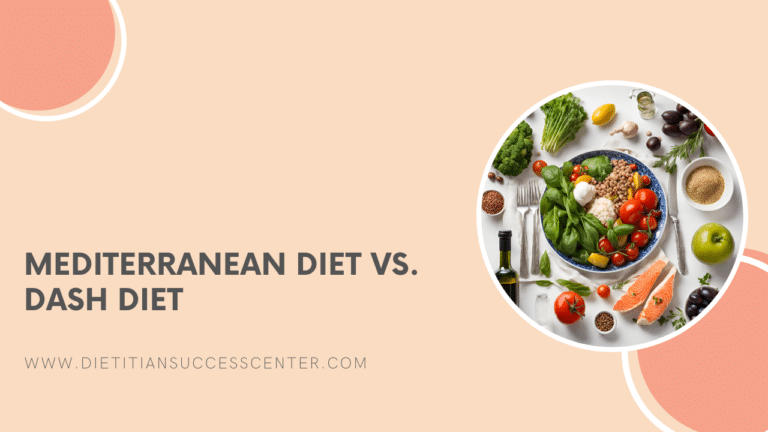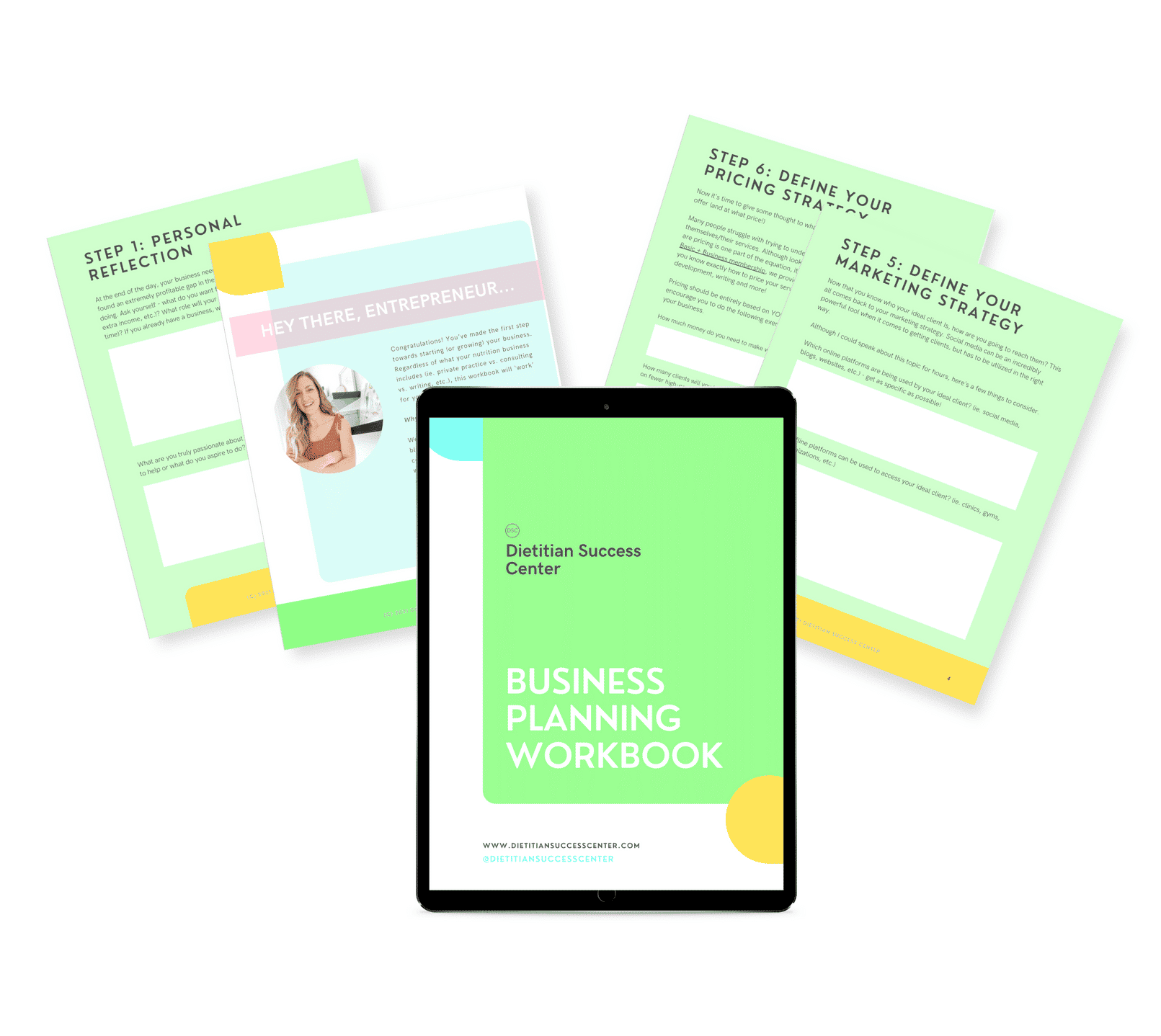
Whether you’re looking to start a dietitian side hustle, you want to leave your 9-5 job to pursue dietitian entrepreneurship full-time or you’re looking for opportunities as a nutrition grad, this list is for you!
Prefer to listen as a podcast? Check out the podcast episode here.
Want to make more money as a dietitian or nutritionist? Here are 15 nutrition side hustles you can do to earn an extra $1000 per month:
1. Create a digital product
Digital products include things like e-books, pdf copies of nutrition guides or recipes books and more!
Digital products are a great dietitian side hustle because they are relatively easy to create and start selling. Aside from the upfront work of creating the product, once it’s done you can continue to sell it over and over again. Simply put the product up on your website, add a way for people to purchase it, market it to your audience and you’re good to go!
Digital products can be a great source of passive income (ie – income that doesn’t require active effort, and can be earned even when you’re sleeping!)
Ideas:
– Take a collection of your recipes and turn them into an e-book
– Take your curriculum, nutrition philosophy or framework and turn it into a downloadable guide
2. Work with clients 1:1
When most dietitian nutritionists think of owning their own businesses, the first thing that comes to mind is seeing clients 1:1 in a private practice. If you want to work 9-5 and see clients occasionally as a dietitian side hustle, that is totally doable.
Check out podcast episode 5 on How to Start a Private Practice for some easy steps to get your practice set up. The DSC Nutrition + Business membership has a ton of step-by-step course content to help you start, grow and scale your business.

3. Online webinars or masterclasses
One of the unexpected benefits that has come from Covid-19 is people’s willingness to utilize online education platforms. There has never been a better time to start offering your services online, whether that be through 1:1 nutrition counselling or a digital course.
If you have a social media following or email list (even just a small one), what about offering a 60-minute paid masterclass on a topic that you are an expert in? Some examples could be – feeding your infant, easy meal planning or grocery shopping tips for weight management. The opportunities are endless!
4. Digital courses
One thing that we are seeing a lot of dietitians and nutritionists do nowadays as a side hustle is turn their expertise into a digital course. One of the reasons why this is an amazing idea is because it is scalable. We only have so many hours in a day where we could potentially see clients 1:1, right? Having a digital course helps you reach more people with your content (and create more passive income).
Check out Online Course Blueprint for a step-by-step course which teaches you exactly how to do this.
5. Subscription services
If you have a specific niche in a certain topic, then a subscription service could be a great idea for your dietitian side hustle. A subscription service means that someone pays a monthly fee to have access to you or resources you develop (like DSC!).
A subscription service could be as simple as creating an exclusive private Facebook group where you do Live Q&A’s and provide valuable information and resources which someone has to pay monthly to join. Or, you can even do a monthly meal planning subscription!
6. Build your social media presence (long-term)
This is an important one for all dietitian nutritionists who are looking to pursue entrepreneurship (or even just to build up their professional profiles!). Building a social media following takes time and consistent effort. Once you get up to a certain number of followers, you may start to get approached by brands to create sponsored content for them. You could also get paid to represent their product in some way.
This can be a lucrative avenue as the health and wellness product space is only growing and expanding as time goes on. There will continue to be opportunities for dietitians and nutritionists to do this work if they want to. So, no, the online nutrition space is not too saturated for you to start!
7. Freelance writing
This is actually how I started my business as a dietitian side hustle. To get jobs, you can use platforms like Upwork, Freelancer, Fiverr or People Per Hour. These are essentially marketplaces where people will post freelance jobs and you can bid on them as a freelancer.
Although it takes some time to get started on these platforms and requires consistent effort to get jobs, it can be fruitful! I once landed a $2000 a month client off of Upwork, so the good jobs are definitely out there.
If you indicate that you do this work on your LinkedIn, you may even get approached by marketing agencies to contract for them. So if you’re interested in writing, make sure to explicitly state that in your LinkedIn bio – this will allow you to be more searchable to people looking for this service.
8. Recipe development
I’ve gotten many recipe development jobs off of the freelancing platforms mentioned above. Many blogs, businesses, food companies, etc. are looking for experts who can create recipes for them.
Here are a couple of the recipe development projects I’ve done to give you an idea of what’s out there:
-
- A vegan recipe e-book for a company looking to promote plant-based eating.
-
- Contributed to a cookbook related to women’s hormone health.
-
- Created a recipe for a food company looking to come up with a “better for you” granola.
-
- Incorporated a brand’s products (ex. Chia seeds, amaranth) into recipes that they could post on their blog.
9. Medical review
Have you ever noticed that on websites like Healthline, their articles will often be written or “medically reviewed” by a healthcare provider? This means that a credible source will review the article to ensure that it is factual and accurate before the company posts it on their website.
Many supplement companies are looking for medical reviewers to look over their content. These companies tend to have a bigger budget to pay you! Again, these jobs are usually obtained via freelancing platforms.
10. Affiliate Marketing
Affiliate marketing basically means that you act as a “sales person” for someone else’s product. You will get a personal link that you can use to post about a product. If someone buys it using your link, you will be given a % of that sale.
In case you’re in the market for any of these resources, here are a few of my affiliate links (so, essentially, I earn a commission when you purchase through the link):
One important thing to remember about being a part of affiliate programs is that you have to disclose this to your audience. So if you are using an affiliate link in a blog post, or on your social media, you must tell your audience that you are receiving a financial incentive for doing so (like I’ve done above). Often, brands will have their own requirements for how you disclose this information, so make sure and look into this before just posting the link.
11. Sell physical goods
I’ve seen some really awesome dietitian-led product-based businesses. As someone who has had a product-based business, this can be a really fun way to make extra income. I’ve seen dietitian’s create body positive t-shirts, fun utensils with foodie memes, reusable snack bags and more!
Selling on Etsy is a great place to get started. It’s very easy to set up an Etsy site – just make sure that you have high quality photos of your items and figure out how you’re going to ship them in advance!
12. Blogging
I had mentioned freelance writing above, but a more long-term strategy can be writing or blogging on your website. If you build up enough traffic to your website, you can start putting ads on it to make extra passive income. With ads, you get paid based on the number of people that view that ad. So, more traffic = more money! Within the DSC Nutrition + Business Membership, we have a course created by Katie Dodd, RD, which teaches you how to get started with blogging.
You can also post your articles on Medium. Medium is a platform where anyone can publish written work. If you publish high-quality work consistently, then you can get paid for the number of people who view your content. There’s tons of opportunity for dietitians to write high quality nutrition information on Medium. If you already have a blog, why not post those articles on Medium as well to increase your traffic and hopefully start to make money off of them?
13. Speaking engagements
Although these jobs may require some active effort to get, speaking engagements can be very lucrative. Many companies are looking for dietitians/nutritionists to deliver lunch-and-learns or seminars to their employees.
Don’t be afraid to reach out and pitch yourself. Come up with a short paragraph on what you would speak about and start reaching out to local companies on LinkedIn.
14. Social media manager
If you’re a creative soul (like me) and enjoy coming up with beautiful Canva images to post on social media, there are TONS of social media management jobs out there. Social media management usually involves creating and posting content on someone’s social media streams, plus engaging with other accounts.
I’ve worked for a few different health or nutrition-focused brands to come up with social media content for their audiences.
Private practice dietitians are always looking for someone to help with their social media, so don’t be afraid to reach out and see if they need some assistance (especially if you’re a student!).
15. Virtual assistant
Being a virtual assistant (whether for a dietitian business or not) could be an excellent opportunity for a student who is looking to earn some side income. Many small businesses are looking for virtual assistants to help them with some of their daily or weekly tasks, whether that be managing their email list, making updates to their websites or posting on social media.
Again, many of these positions are available on freelancing platforms, or even conventional job boards like Indeed.
*Bonus* Build up your online presence!
So my final side hustle (which isn’t really a side hustle, but more of a tip) is to just start building up your online presence. By that, I mean, start an Instagram account, start posting on your LinkedIn, create a website for your personal brand, etc.. You never know what opportunities might come to you but if you’re not visible online, then you’re never going to find them!
Dietitian Success Center is THE professional development resource for dietitians and dietetic students. Our mission is to make it easier for dietitians and dietetic students to build expertise. We do this through evidence based online nutrition courses, community and ready-to-use client handouts. Plus – we give you the tools to start and grow your dietitian private practice!










